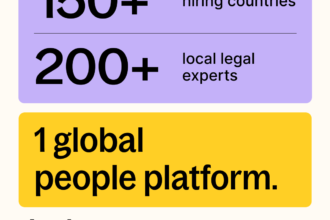✅ 1. Global Coverage & Local Expertise
Does the provider cover the countries where you need to hire? Each market has unique labor laws, tax structures, and HR requirements.
🔍 What to look for:
✔️ Coverage in all key markets you plan to expand into.
✔️ In-depth knowledge of local labor laws and employment regulations.
✔️ Strong legal teams to ensure full compliance with government policies.
💳 2. Transparent Pricing & Cost Efficiency
EOR pricing varies based on service scope and regions. Some providers charge flat fees, while others have hidden costs for payroll processing, benefits, and compliance.
🔍 What to look for:
✔️ Clear, upfront pricing without hidden fees.
✔️ Flexible pricing models suited for your hiring needs (per employee/month, flat rate, or percentage-based).
✔️ Competitive rates that save costs compared to entity setup.
📜 3. Compliance & Risk Management
One of the biggest advantages of an EOR is compliance assurance. The right provider should handle worker classification, tax compliance, and employment contracts seamlessly.
🔍 What to look for:
✔️ Expertise in local employment laws and tax requirements.
✔️ Strong compliance frameworks for handling data protection & employment risks.
✔️ Ability to manage worker misclassification risks for contractors and full-time hires.
⚡ 4. Payroll Processing & Benefits Administration
EORs handle salary payments, tax deductions, and benefits, but the quality of payroll services can vary. Look for a provider that ensures timely and error-free payroll processing.
🔍 What to look for:
✔️ Automated, on-time salary processing in multiple currencies.
✔️ Localized benefits administration (healthcare, pensions, social security).
✔️ Compliance with global tax regulations to avoid penalties.
📈 5. Technology & Integration Capabilities
A modern EOR should offer user-friendly dashboards, automated reporting, and API integrations for a seamless experience.
🔍 What to look for:
✔️ Cloud-based HR platform for managing employees in different countries.
✔️ Integration with HRIS, payroll, and accounting systems.
✔️ Real-time access to employee records, tax filings, and contracts.
🤝 6. Customer Support & Employee Experience
Your EOR provider should offer personalized support to both your HR team and employees. A poor employee experience can impact retention and productivity.
🔍 What to look for:
✔️ Dedicated account managers and local HR support.
✔️ 24/7 assistance for payroll, benefits, and compliance queries.
✔️ Multilingual support for international teams.
Making the Right Choice: Questions to Ask Your EOR Provider
📌 Which countries do you cover, and how do you ensure compliance?
📌 What is your pricing structure, and are there any hidden fees?
📌 How do you manage payroll, taxes, and benefits?
📌 Do you offer real-time reporting and platform integrations?
📌 What support services do you provide for employers and employees?
Choosing the right EOR provider can streamline your global hiring process, reduce risks, and enhance employee satisfaction.
🚀 Looking for a reliable EOR partner? Talk to Our Experts







